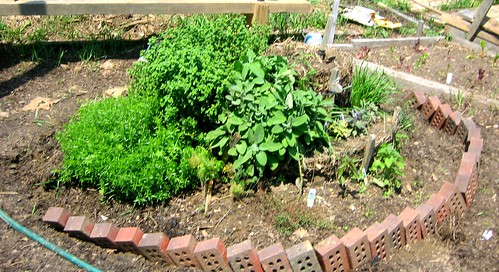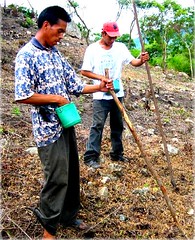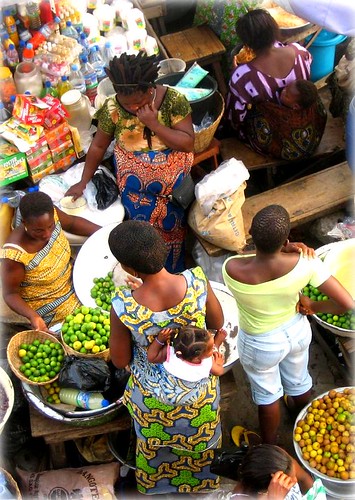
Friday, May 23, 2008
Monday, May 19, 2008
La Situación Alimentaria Mundial
IFPRI acaba de publicar recientemente la versión en español de su excelente reporte sobre la crisis alimentaria:
La Situación Alimentaria Mundial
Nuevos factores y acciones necesarias
Joachim von Braun
Diciembre 2007
Sunday, May 18, 2008
Friday, May 16, 2008
Farm Bill
The insignificant increases in nutrition assistance to the poor at home and abroad, conservation, farmers markets, organic food, and minority farmers also part of the Farm Bill, do not hide the fact that there is still millions of dollars going to wealthy farmers. Both editorial pages of the New York Times and Wall Street Journal criticized the measure, showing the hypocrisy of parties across the isle that succumb to the interest of agribusiness lobbying groups and not the majority of taxpayer Americans, not to mention the millions across the world that will be affected by these policies.
For a good list of reasons to oppose this bill check out the blog of Harvard's Professor Greg Mankiw gregmankiw.blogspot.com (may 14th post)
new job
Sorry I haven't posted much lately but I been very busy with my new job at Fabretto Children's Foundation. I'll be writing proposals and projects for projects in agriculture, education and rural development. Check our website or see this vido about the NGO
Best,
Monday, May 12, 2008
Jobs with Development Contractor
Last week, the Society for International Development hosted its Annual Career Fair. Besides having the opportunity to talk to employers from different sectors of the international development arena, invitees had also the opportunity to see thoughtful presentations on the latests trends in International Development and the implication of such trends for jobs in the sector.
One presentation that i really enjoyed was by Tony Barclay, Chief Executive Officer of Development Alternatives Inc. He talked about the type of work contractors do and how it has change over the years. He also spend some time describing the set of skills needed to work with contractors and how the job market both on the demand and supply side is changing for those interested in entry level positions. Mr. Barclay agreed to share with the readers of this blog his presentation, which I'm sure some of you will find very useful. Find it HERE.
Stay tunned as more and more material will be available under the "4s" tab
Saturday, May 10, 2008
Una columna para ignorar
Comentario en respuesta al articulo: No se cual con que argumento el Dr. Restrepo defiende su tesis de que “mercantilismo perdió su guerra contra la acción estatal sobre todo en asistencia y regulación”. Si algo podemos concluir de la crisis de los precios de la comida es que es, precisamente, la regulación excesiva del gobierno lo que ha causado en gran parte esta crisis catastrófica. Pueda que resulte más rentable sembrar maíz para producir energía en vez de comida. Pero esto se da gracias a las regulaciones masivas en forma de subsidios que el gobierno de USA esta dando a sus productores para que produzcan más. Sin estas, el maíz para etanol, simplemente, no seria rentable. Fuera de eso, la regulación gubernamental a través de tributos a exportaciones no ha hecho mas que agravar el problema, al disminuir la cantidad de comida disponible globalmente y generar desincentivos de producción. El aprendizaje de esta crisis ha de ser que la sobre-regulación gubernamental del sector agrícola en países desarrollados y en vía de desarrollo nos aleja cada día mas del precio real de la comida, haciendo el sector menos eficiente e incapaz de seguir alimentado a un mundo que cada día quiere comer mejor.
Friday, May 09, 2008
Biotechnology News
Source:Reuters
Author:James Kanter
Food Crisis: Political Will Needed for Scientific Solutions to Reach African Farmers
Source:African Science News Service
Author:Henry Neondo
Click on "Read More" to see a completed post
Sustainable Agriculture, Stewardship and Genetically Engineered Animals
Source:Genetic Engineering News
Author:n/a
Bt corn in Spain—the performance of the EU's first GM crop
Source:Nature Biotechnology
Author:Manuel Gómez-Barbero, Julio Berbel & Emilio Rodríguez-Cerez
National Seminar on Bioethics in Indonesia
Source:Crop Biotech Update
Author:n/a
Regulating Transcription Regulators for Second Generation Biotech Crops
Source:Crop Biotech Update
Author:n/a
Scientists to Capture DNA of Trees Worldwide for Database
Source:Associated Press
Author:Deepti Hajela
Event Notification: International Conference on Grain Legumes
Source:Crop Biotech Update
Author:n/a
Shortages Threaten Farmers' Key Tool: Fertilizer
Source:The New York Times
Author:Keith Bradsher and Andrew Matrin
Oilseed Rape Resistant to Sclerotinia
Source:Crop Biotech Update
Author:n/a
IFPRI Hosts COP-MOP 4 Events
Source:Crop Biotech Update
Author:n/a
Thursday, May 08, 2008
Brookings on Global Food Crisis
FAO Gets it
Now, keep in mind that this is not an option for the bast majority of the poor living under very vulnerable circumstances, specially in West Africa and South Asia. They tend to be net food consumers, so price increases affect directly their spending habits, resulting in less quantity and less quality of food. This is more prominent in urban and periurban areas where food prices are more connected to the international market. For such populations, the UN guidelines are a good starting point on how to deal with the crisis.
Wednesday, May 07, 2008
More en Español
Aunque el Dr. Montoya no propone nada concreto, queda claro que el acento de esta columna se asemeja mucho a aquellos que promueven políticas proteccionistas bajo la excusa de la seguridad alimentaría. Japón primero dijo que era cuestión de seguridad, ahora dice que es por mantener su tradición, y en un futuro muy cercano se inventara otra excusa para mantener subsidiado su arroz que cuesta producir 11 veces más que en otras regiones del mundo. No podemos caer en la trampa en que están cayendo muchos al proteger nuestras fronteras y limitar nuestras exportaciones agrarias bajo el escudo de la seguridad alimentaría. No hay mejor forma de llegar a esta que con un campo prospero y competitivo y esto solo se hace con la dinámica de los mercados del mundo. ¿Acaso vemos inseguridad alimentaría en las lomas del eje cafetero o en las planicies del valle del cauca? ¿a donde va toda esa azúcar a ese grandioso café? Al extranjero.
En Burkina Faso (con una “s”) se sufre pero la crisis viene desde hace mucho antes. Con USA subsidiando su el algodón y otros granos bajo la excusa de la seguridad alimentaría, lo que han hecho es reducir los precios a nivel mundial. Ahora la crisis esta patas arriba, pero lo que queda claro es que esta crisis es el resultado de políticas miopes que tratan de controlar el sector agrícola generando consecuencias catastróficas en el resto del mundo, sobre todo en aquellos países que dependen de importaciones para alimentarse. La inseguridad alimentaría esta directamente relacionada a las acciones de gobiernos que tratan de “proteger” el sector generando así desincentivos a sus productores y alterando cada vez más el precio real de los productos. Para afrontar esta crisis mundial los países del mundo tienen que dejar el egoísmo y pensar en el bienestar global. Espero que Colombia lo haga.
Monday, May 05, 2008
Expensive fufu and other things
What better example than Somalia: As we speak, thousands are rioting the street of Mogadishu over the food prices, and other things that may get buried behind the headlines. This is important because there are many out there that believe everything was peace and love and then the prices hit. But Somalia is just one of many countries where the "perfect storm" is threating social stability: According to The Food and Agriculture Organisation (FAO) if this situation is not checked insecurity is bound to escalate and like the recent riots in Egypt, Cameroon, Burkina Faso, Senegal, Cote d'Ivoire and Haiti. FYI Senegal denies there are hungry people in the country and has even blame FAO for the contributing to the crisis.
Los Precios de la Comida; desafíos y oportunidades para Latinoamérica
Hola hispanoparlantes,
Una gran sorpresa me lleve el día de ayer al visitar El Tiempo (principal periódico Colombiano) y encontrar que su editorial del domingo estaba dedicado a la crisis de la comida, y no al las ultimas revelaciones del escándalo de la parapolitica. Me ha llamado mucho la atención como, hasta cierto punto, Latino América ha estado ausente en el cubrimiento mediático que se le ha dado a las alzas de los precios de la comida. Espero que la columna del tiempo fomente un debate fundamental que se debe dar en nuestro países acerca de cómo afrontar la crisis y como aprovecharla.
¿Pero porque la ausencia de Latinoamérica en esta importante discusión? Basta con revisar los principales titulares de las grandes cadenas informáticas mundiales para darse cuenta que su enfoque regional gira en torno a la mayoría de países africanos y algunos en Asia. Es mas, al visitar la pagina de uno de los principales financiadores de proyectos de desarrollo en Latino America, el BID, uno no encuentra referencia alguna a esta crisis. No se puede decir lo mismo del Banco Mundial, o los bancos regionales de Asia y Africa, estos han llevado a cabo iniciativas importantes para enfrentar el problema.
La respuesta a la ausencia de Latinoamérica en esta discusión se remonta a décadas atrás. Básicamente, en Latino America la agricultura desde hace ya mucho tiempo dejo de tomar un papel relevante. Recordemos que en los 60’s y 70’s el modelo de desarrollo era la industrialización, en gran mediada a costa de tributos absurdos al sector agrícola (esto tiene acento Argentino). La agricultura se veía como una actividad tradicional de retaguardia, algo que había que dejar para poder “prosperar”. Nuestros gobernantes administraron de las ciudades a las ciudades, teniendo en cuenta las poblaciones rurales en aquellos periodos cuando estas pasaban a llamarse electorado.
También, al ser Latinoamérica uno de los epicentros de la revolución verde, se pensó que el problema de la comida dejo de existir. Obviamente, nuestros países no tienen los índices que se ven en algunos países Africanos. Pero si hacemos el mismo análisis a nivel regional, nos daremos cuenta que hay partes de nuestro continente que presentan índices aun peores que aquellos de Africa. Estas regiones tienden a vivir en zonas marginales, donde el abandono y abuso estatal ha sido el común denominador por décadas de condiciones supremamente precarias.
Nos tomo muchos años para darnos cuenta que el sector agrícola provee los cimientos esenciales para una economía fuerte y sobre todo para las reducciones en los niveles de pobreza. Pero hoy en día, el sector agrícola, con excepción de algunos países como Brasil y Chile, aun sigue en un estado de negligencia estatal deplorante, sobre todo en un momento de la historia en el que este mismo tiene la capacidad de proveer los recursos tan necesitados para desarrollar las zonas rurales, donde tiene a concentrarse más la pobreza.
¿Entonces que debe hacer latino América frente esta crisis?
En primer lugar debemos reconoce y atender aquellas poblaciones mas vulnerables. No podemos caer en la trampa de políticas de corto plazo, netamente asistencialitas puesto que sabemos que estas perpetúan el problema. Lo que se debe hacer es crear los incentivos adecuados para que poco a poco estas poblaciones tengan la capacidad de salir del círculo vicioso de la pobreza. Esto se hace invirtiendo en infraestructura, mejorando y fomentado técnicas agrícolas, conectado estas poblaciones con mercados dispuestos a pagar por sus productos, asegurado el cubrimiento estatal de servicios básicos de salud, educación, y seguridad etc. Es decir, se necesita una política comprensiva que conecte el campo con el resto del país y el mundo, haciéndolo mas prospero.
También, los países latinoamericanos deben aprovechar la gran demanda mundial que ha venido surgiendo en torno a los granos básicos. Nuestro continente cuenta con millones de hectáreas que pueden ser cultivadas y otra gran cantidad donde la producción pude ser intensificada. Eso si, asegurándose que el impacto ambiental sea minúsculo y que exista una protección social a la mano de obra rural.
En todos estos puntos, nuestros gobiernos han de jugar un papel central. Pero para llegar a este nivel, tenemos que reconocer la relevancia de la agricultura, invertir en esta, y cosechar los frutos. Espero que los altos precios de la comida generen los incentivos adecuados para algo que debió comenzar décadas atrás.
Multilateral Banks and the Food Crisis
Hi There,
A friend of mine just point out to me how the blog was missing out some of the efforts put together by the World Bank to address the current food crisis. Besides publishing their World Development Report with the topic of agriculture, the World Bank has been instrumental in brining agriculture back to the donors and governments discussion table. The timing, as you all know, couldn't be better: The increases in food prices present an enormous challenge for countries in Africa Sub-Saharan and South Asia to finally address the decades of negligent policies towards the rural sector. In the urban centers, where the price increases are more prevalent, governments have the challenge to ensure that the very needy are meeting their calorie requirement.
But this crisis is also an unprecedented opportunitiy for other regions of the world with potential to intensify and/or expand their agricultural capacity. These countries can reap huge benefits from the price increases, a win win scenario as world prices will decreased and thousands of jobs will be created. That said, multilateral banks must persuade governments not to put in place policies that generate disincentives that could avert such benefits: limit on export, price ceilings, and taxation are just some examples of policies making matters worse. Also to take into consideration is the potential negative environmental and social impact such expansion could have.
In sum, the World Bank must play a central in addressing the challenges of those countries in Africa and Asia and enabling other countries to capture the potential benefits this crisis will bring. These can only be archived by providing incentives for agricultural investment, persuading governments to follow policies that will benefit the world as a whole, and ensuring that the basic needs of those must vulnerable are met.
Check out this interview to Senior Economist at World Bank’s Agriculture Unit Robert Townsend. Also, don't forget to visit the special website WB put together about World Food Prices
Friday, May 02, 2008
More on Food Prices: article from Financial Times
Of the two crises disturbing the world economy – financial disarray and soaring food prices – the latter is the more disturbing. In many developing countries, the poorest quartile of consumers spends close to three-quarters of its income on food. Inevitably, high prices threaten unrest at best and mass starvation at worst.
keep reading article HERE




